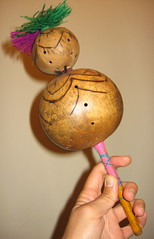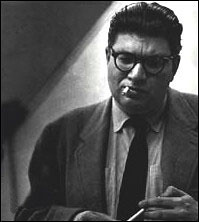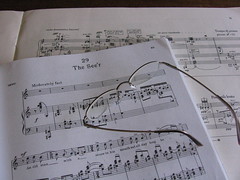Relationships Continued, part 1
The real (and undeniably physical) relationship occurs between performer and score, sans composer. Sordid or not, affairs with particular pieces color a performer's past. Whenever I hear Beethoven's Second Piano Concerto, for example, I remember my own silly summer fling with the piece. I learned it impossibly fast, took it to a piano competition, didn't win but thoroughly enjoyed competing, then dropped it and moved on to other repertoire. It was time well spent and an experience worth smiling back on, but nothing more. I've endured a much more tortuous relationship with Mozart's "Batti, batti." The damn piece borders on cute but too quickly turns annoying, and it has a way of turning up again and again when I least expect it. Zerlina's pleading nonsense interests me for about forty seconds; then I have to paste on a grin and bear my way through the clumsy-ugly accompaniment. I vow to write my own before the next "Batti" encounter, to rearrange the orchestral score and rid the reduction of its boxed-in registrations and pointless doublings. (Either that, or I will start playing it on a toy piano!) But demanding such changes and wanting to "fix" all the quirks seem, somehow, not quite fair, and so after a round of auditions or a studio recital, I usually just tuck Don G back into its spot on the bookshelf.
The string of musical relationships seems endless and it only gets more humorous, as when outsiders--friends and relatives with the best of intentions--tend to blow particular performances out of proportion. I certainly enjoy playing Debussy's Reflets dans l'eau (and, more recently, John Cage's In a Landscape) and am quite comfortable with this sort of gauzy, moody, evocative style, but these pieces are not the source of my most gut-wrenching relationships. Rather, like Bach Inventions or Bartok Mikrokosmos, or any number of French or German art-song accompaniments, I think of these pieces as the "good friends" who check in on my chops and keep me happy and motivated from day to day. When listeners remark on my "special connection" to the Debussy, or the "obvious intimacy" with which I play In a Landscape, I have to graciously accept their complements and tell myself that friends being perceived as lovers is really a much better situation than being head over heels for pieces that are obviously and completely wrong for me. The Webern Variations and Dallapiccola's Quaderno Musicale di Annalibera? I wince, remembering. Only now, years later, do I admit to my very clouded judgment regarding those pieces. (The puzzle of the Webern still intrigues me, but for some reason I could never establish a "feel" for the piece as a whole. We were like oil and water, the Variations and I.)
But of them all, I most cherish the unique continuing relationship, the one where, over months or years, I develop a very special understanding for a particular piece. The process, often far from straightforward, encourages discovery that yields a highly personalized performance.
continue reading...
 Today I depart for a week in Mexico City to visit holy shrines and sing lovely songs with the
Today I depart for a week in Mexico City to visit holy shrines and sing lovely songs with the 
 I ease my grip and cease wrestling Mr. Feldman. Asking for direction, needing to attach meaning, seeking the master plan...those things are unimportant. Instead, we sit back and chat like old friends, with no expectancy, no assumptions, and no subliminal persuasions. We argue amicably, tentatively agreeing that living (and experiencing music) "for the moment" is challenging, sometimes not entirely satisfying. In some respects, a draw is the best a performer can hope for: whether engaged in a wrestling match, secret tryst, or worshipful state of idolatry, a performer needs to find their peace with the ghostly presence of the composer. Speaking more practically, trusting the composer and their music--whatever the style--comes with familiarity, with repeated practice and performance. Though I feel somewhat more prepared to begin to the process of learning (familiarizing myself) with one of Feldman's
I ease my grip and cease wrestling Mr. Feldman. Asking for direction, needing to attach meaning, seeking the master plan...those things are unimportant. Instead, we sit back and chat like old friends, with no expectancy, no assumptions, and no subliminal persuasions. We argue amicably, tentatively agreeing that living (and experiencing music) "for the moment" is challenging, sometimes not entirely satisfying. In some respects, a draw is the best a performer can hope for: whether engaged in a wrestling match, secret tryst, or worshipful state of idolatry, a performer needs to find their peace with the ghostly presence of the composer. Speaking more practically, trusting the composer and their music--whatever the style--comes with familiarity, with repeated practice and performance. Though I feel somewhat more prepared to begin to the process of learning (familiarizing myself) with one of Feldman's 



